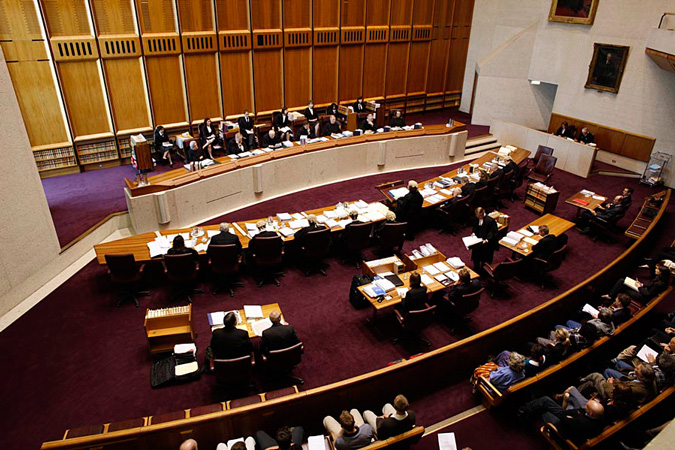
Can a court override a private written agreement entered between married parties?
The High Court recently upheld a Family Court’s decision that ordered that the wife’s 50% interest in a property be transferred back to the husband.
In the recent decision of Hsiao v Fazarri[2020] HCA 35 , the High Courtconsidered the case of a husband who had initially gifted the wife 10% interest in the property and later signed a transfer giving the wife a further 40% interest in theproperty.
Upholding the lower Family Court’s ruling, the High Court agreed that it was “just and equitable” that the husband’s 50% interest be returned to him, despite him earlier signing a document giving that interest to the wife.
The facts
In August 2012 the parties commenced a relationship but were living separately.
The husband purchased a property in 2014 for $2,200,000 and made a gift to the wife of a 10% interest in that property.
Approximately 8 months later, while the husband was hospitalised due to a suspected heart attack and under pressure from the wife, he signed a transfer of land that gave the wife a further 40% interest in the property.
The transfer was subsequently registered and the parties became joint tenants.
Neither of the documents signed by the husband were binding financial agreements.
Sometime there after the parties signed a deed of gift which provided that if the husband survived the wife while they remained joint tenants of the property then he would pay one half of the value of the property to the wife’s siblings. The deed further provided that such payment should be taken into account if the parties were to separate or divorce.
In August 2016 the parties married which lasted some 23 days.
What happened initially?
In November 2016, the husband commenced proceedings in the Family Court seeking that there be an adjustment of property such that the wife’s interest in the property be transferred to him. The wife did not appear at the trial and it proceeded on an undefended basis.
At trial, Cronin J:
- severed the joint tenancy;
- ordered the wife to transfer her interest in the property to the husband; and
- ordered the husband to pay the wife $100,000.
Deciding that it was just and equitable to make a property adjustment order, the judge found that although the wife received the initial 10% as a gift, her conduct in acquiring the further 40% could not be seen in the same light as the initial gift. His Honour also noted the short term of the marriage and that the wife’s financial and non-financial contributions to the acquisition, conservation and improvement of the property were modest.
What happened on appeal?
The wife appealed to the Full Court of the Family Court arguing that the trial judge had erred by failing to identify the existing legal interest of the parties, incorrectly treating the further 40% transfer as vitiated by pressure and sought to adduce further evidence on the circumstances by which she obtained the further interest.
Her appeal was unsuccessful. The Full Court,in upholding that it was just and equitable to make the property adjustment orders, stated that none of the evidence – which the wife had deliberately not filed before trial – would have produced a different result; and it was not in the interest of justice to receive such further evidence on appeal.
The wife’s High Court appeal
Taking her case to the highest court in Australia – the High Court, the wife argued that the deed- which contained a provision that payment was to be made to her in the event that the parties separated or divorced – was a material consideration that trial judge failed to take into account.
The High Court considered the principles set out in its seminal decision in Stanford (Stanford v Stanford) [2012 HCA 52 – , particularly whether it was just and equitable to make a property order altering the interests of the parties.
In rejecting the wife’s argument, the majority of the High Court stated that her argument was based on a misconstruction of the deed and it that it was open to the trial judge to be satisfied that it was just and equitable to adjust the parties’ property interests. Further, that it was open for a finding to be made that the wife’s financial contribution to the property was no greater than 10%.
The majority said in relation to the deed and whether Cronin J had erred (at [53]):
“….His Honour’s reasons reflected the arguments that were put to him. The trial was the place to adduce such evidence and put such arguments as might favour a different finding as to the parties’ respective financial contributions for the purposes of s 79(4)(a).
The trial was not some preliminary skirmish which the appellant was at liberty to choose not to participate in without consequence. Her right of appeal was a right to have the Full Court review whether the primary judge’s discretion to make a property settlement order had miscarried, applying the well-established principles expressed in House v The King ((1936) HCA 40. It was not an opportunity for the appellant to make a case that she chose not to make at the trial. The Court is invested with a wide discretion under s 79(1) to make such order as it considers appropriate. It should not be concluded that his Honour’s assessment of the parties’ respective financial contributions, in this singular case, was not open.”
As to the wife’s argument that the Full Court had erred in refusing to receive further evidence on the appeal, the majority of the High Court confirmed that the Full Court was correct to not receive the wife’s further evidence and said at [43]:
“…The trial was the opportunity for the appellant to put her case and the appellant chose not to participate in it.”
Dismissing with costs,the wife’s appeal,the High Court (by majority):
- found that the Full Family Court was not in error in making property adjustment orders under s79(1) of the Family Law Act 1975; and
- refused to exercise its discretion to receive further evidence on appeal.
Lessons to be learnt
- It is crucial for a party to not only participate in proceedings from the beginning, but to provide all available evidence to the court.
- A party’s right to appeal is not a right of a party to make their case on appeal that they chose not to make at trial.
- Agreements that seek to divide property of parties must be drafted carefully and there is no certainty that any such agreement will be upheld by the Court.
- There is always a risk of a costs order being made against anunsuccessful party.

